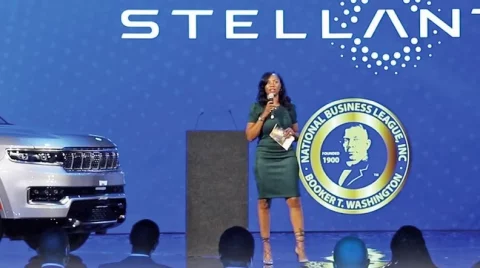Ten35 and other companies that participated in the pilot are now applying the lessons they learned to their day-to-day operations and encouraging other businesses to apply for upcoming rounds in the years ahead.
The program sent the companies through a training slate beginning last November that guided them on topics such as building up capacity, creating a brand and managing finances. They received tips on how to refine their elevator pitches, for instance, and heard from successful Black business owners such as Leon Richardson, chief executive officer of Chemico Group, a Southfield-based chemical management company with clients in various industries including automotive and defense.
The initial group of suppliers graduated in February, and Stellantis said the next set of companies will be announced this month.
Moses Shepherd, who owns Detroit-based fuel supplier ACE Petroleum, said the elevator pitch critiques were critical to him at a time when he’s looking to grow his clientele. The training he did with Stellantis inspired him to have everyone in his company give him their own elevator pitches.
The effort has led to ACE acquiring more customers, Shepherd said.
Adam Claytor, chief executive officer of Coltrane Logistics & Trucking in Wixom, enjoyed the interactive nature of the sessions.
The financial management and capacity-building aspect, Claytor said, were some of the more informative parts of the program.
“That was the most critical for us in terms of the growing part because [when] everyone wants to start a business, they want to have customers knocking at your door,” Claytor said, “but the hard part is actually having the capability to scale.”
While developing a curriculum, Stellantis consulted with suppliers to find out what they needed, said Greg Hawkins, the automaker’s manager of supplier diversity and project lead for the program.
Hawkins said Stellantis went into it with a focus on making sure the suppliers in the program were prepared to work with Fortune 500 companies, not just Stellantis.
But the automaker discovered that some of the suppliers were already in a position to team with Stellantis and connected with them on projects.
Looking ahead, Hawkins said Stellantis is looking to add an in-person element to the experience and build a matchmaking component in which Stellantis connects the companies with its tier one and tier two suppliers to foster interaction.
“We’re amping up the touch points where we see that there’s going to be genuine interest not only from the suppliers who are in the program, but also the OEMs and suppliers who have been seeing the program from afar,” Hawkins said. “We’re actively creating those opportunities for them to engage.”
Wright, of Ten35, said the sessions helped in areas such as long-term planning.
“It allowed us to take a different perspective and also have access to resources that had a different vantage point, not necessarily industry-specific but business-specific,” Wright said.
“Some of the business modeling and strategic planning really allowed us to take a fresh approach and look at our business, identifying blind spots that we hadn’t seen before as well as opportunities to capitalize on those blind spots for continued growth.”
Success stories
The National Business League wanted to work with Stellantis because of its experience in supplier diversity.
Chrysler founded its minority supplier program in 1983 and has spent more than $60 billion with diverse suppliers since then.
The new program was born after the automaker’s diversity and inclusion office, led by Lottie Holland, met with the business league and brainstormed ideas.
Brittany Stovall, co-founder and chief executive officer of Assured Quality Systems, said the brand-building portion of training was particularly helpful. She also considered the success stories from guest speakers such as Chemico’s Richardson among her favorite moments during the program.
Her Grand Prairie, Texas, company offers services for manufacturers such as corrective and preventative action on nonconforming parts, inventory control and engineering staff support.
“What some of us, especially as small businesses, don’t understand is your brand means everything, and sometimes you are your brand, so how do you market that correctly?” Stovall said. “How do you make sure your customer understands your core values as a company, but also you as an owner because at the beginning stages and at the small stages of a business, your brand individually is just as important as your brand holistically as a company.”

